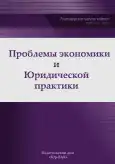Analysis of Digital Strategies of the USA and South Korea for the Russian Practice
- Authors: Moreva E.L.1, Obolenskaya L.V.1, Abrosimova O.M.1
-
Affiliations:
- Financial University under the Government of the Russian Federation
- Issue: Vol 18, No 5 (2022)
- Pages: 180-189
- Section: Articles
- URL: https://bakhtiniada.ru/2541-8025/article/view/147362
- ID: 147362
Cite item
Abstract
About the authors
Evgeniya L. Moreva
Financial University under the Government of the Russian Federation
Email: elmoreva@fa.ru
Cand. Sci. (Econ.), Associate Professor; Deputy Director Moscow, Russian Federation
Lyudmila V. Obolenskaya
Financial University under the Government of the Russian Federation
Email: obolenskayalv@gmail.com
Cand. Sci. (Eng.), Leader research associate Moscow, Russian Federation
Olga M. Abrosimova
Financial University under the Government of the Russian Federation
Email: omabrosimova@fa.ru
Research Intern Moscow, Russian Federation
References
- Chakravorti B., Chaturvedi R., Filipovic C., Brewe G. (2020). Digital in the time of covid. Trust in the Digital Economy and Its Evolution Across 90 Economies as the Planet Paused for a Pandemic. The Fletcher School at Tufts University.
- Chipidz W., Leidner D. (2019). A review of the ICT-enabled development literature: Towards a power parity theory of ICT4D // The Journal of Strategic Information Systems Volume 28, Issue 2, June 2019, Pp. 145-174.
- Guenduez A., Mettler T., Schedler K. (2020). Technological frames in public administration: What do public managers think of big data? // Government Information Quarterly, 37(1), Article 101406. https://doi.org/10.1016/j.giq.2019.101406.
- Kinder, T., Six, F., Stenvall, J., & Memon, A. (2020). Governance-as-legitimacy: Are ecosystems replacing networks? // Public Management Review, 00(00), 1-26. https://doi.org/10.1080/14719037.2020.1786149.
- KISTEP, (2014) Introduction to Creative Economy & The 3rd Science and Technology Basic Plan in Korea.
- Luthfi A., Janssen M. (2019). Open data for evidence-based decision-making: Data driven government resulting in uncertainty and polarization. // International Journal on Advanced Science, Engineering and Information Technology, 9(3), 1071-1078. https://doi.org/10.18517/ijaseit.9.3.8846.
- Mergel I. (2019). Digital service teams in government. // Government Information Quarterly, 36, Article 101389. https://doi.org/10.1016/j.giq.2019.07.001.
- Mergel, I., Bell´e, N., & Nasi, G. (2019). Prosocial motivation of private sector IT professionals joining government. // Review of Public Personnel Administration, 1-20. https://doi.org/10.1177/0734371X19886058.
- Mergel, I., Gong, Y., Bertot, J. (2018). Agile government: Systematic literature review and future research. // Government Information Quarterly, 35(2), 291-298. https://doi.org/10.1016/j.giq.2018.04.003.
- OECD (2020), «Going Digital integrated policy framework», OECD Digital Economy Papers, No. 292, OECD Publishing, Paris, https://doi.org/10.1787/dc930adc-en.
- Sklyar A., Kowalkowski C., Tronvoll B., Sörhammar D. (2019). Organizing for digital servitization: A service ecosystem perspective. // Journal of Business Research, 104, 450-460.
- Verhoef P., Broekhuizen T., Bart Y., Bhattacharya A., Qi Dong J., Fabiana N., Haenlein M. (2021). Digital transformation: A multidisciplinary reflection and research agenda // Journal of Business Research Volume 122, January 2021, Pp. 889-901.
- Virkar, S., Edelmann, N., Hynek, N., Parycek, P., Steiner, G., & Zenk, L. (2019). Digital transformation in public sector organisations: The role of informal knowledge sharing networks and social media.International Conference on Electronic Participation, 60-72.
- Vial G. (2019). Understanding digital transformation: A review and a research agenda // The Journal of Strategic Information Systems Volume 28, Issue 2, June 2019, Pp. 118-144/
- Wirtz B., Daiser P. (2018). A meta-analysis of empirical e-government research and its future research implications. // International Review of Administrative Sciences, 84 (1), 144-163/
- Zhang J, Zhao W, Cheng B, Li A, Wang Y, Yang N and Tian Y (2022). The Impact of Digital Economy on the Economic Growth and the Development Strategies in the post-COVID-19 Era // Front. Public Health, 2022, vol.10, art. 856142.
Supplementary files








